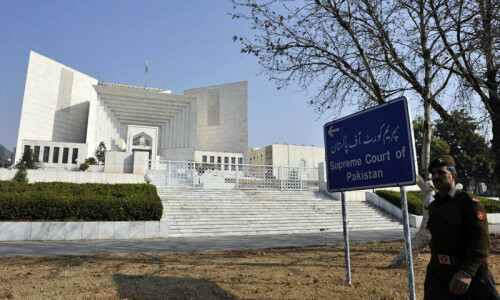• Officials in charge summoned, given two weeks to explain why action may not be taken against them
• CJP regrets rules transgression has affected academics, standing of Pakistani universities
ISLAMABAD: The Supreme Court has ordered public sector universities not to leave top positions like that of vice-chancellors or presidents vacant, otherwise they would be guilty of contravening applicable laws.
“The universities must comply with their respective laws and if those in charge of them are disregarding the same for no justifiable reason, then they must demonstrate that they are still competent to hold their respective positions,” warned Chief Justice of Pakistan (CJP) Qazi Faez Isa in a nine-page order issued on Friday.
The observation came on a petition moved by Advocate Umer Ijaz Gillani on behalf of All Public Universities BPS Teachers Association (APUBTA) through its president Dr Samiur Rahman.
In its order, the CJP observed that public universities must not leave important positions of vice-chancellors, presidents, vice presidents, registrars, heads of faculties and departments, controller of examination and director finance vacant as in doing so they contravene the applicable laws. This state of affairs whereby the law is disregarded cannot be allowed to continue, the CJP cautioned.
A report furnished on behalf of the Ministry for Federal Education and Professional Training suggests that many tenured positions in public universities that fall under their domain have been filled-in on a temporary basis which does not appear to conform to the law. The court also summoned explanations from different provinces for the violation of applicable laws.
At the hearing, the court was told that the Higher Education Commission (HEC) had prescribed 1:1.5 ratio of academic to non-academic staff, but nearly all varsities fail to abide by as the non-academic staff far exceeds this ratio.
“This appears to be one of the reasons for the financial problems being faced by the varsities,” the CJP observed, adding the federation, provinces and the Islamabad Capital Territory should furnish reports suggesting whether directions have been issued to ensure that the universities would restrict/stop further employment of non-academic staff.
The laws governing these universities require that the meetings of syndicates, senates, boards of governors and boards of trustees, as applicable, must be periodically held. Considerable amount from the public exchequer was spent on public sector universities, the court noted, adding the universities must abide by their respective laws.
Unfortunately, many universities were being run in contravention of their laws on the personal whim of those placed in charge, the CJP regretted, adding that the transgressions adversely affected academics, the reputation and standing of Pakistani universities and also undermine the degrees awarded by them.
Two-week deadline
The court also ordered to dispatch the copies of the order to the respective vice chancellors/rectors and to all those non-compliant. They are required to submit within two weeks of the receipt of the notice their response under their own signatures explaining why they are not complying with the law governing their university and why appropriate actions may not be recommended to be initiated, or be initiated, as the case may be, against them. They are also required to be in attendance on the next date of hearing, the court said.
Earlier, the APUBTA in its petition argued that ad hoc appointments of VCs and rectors were eroding academic freedom within the universities and therefore connected with the enforcement of the fundamental rights of the people of Pakistan, the petition contended.
The petition sought a direction from the Supreme Court to order respondents to immediately fill the post of VCs in all the public sector universities in accordance with law and declare that the appointments to tenured-based posts cannot be made through till-further-orders notifications.
The respondents should also ensure that the key decision-making bodies of the universities such as Board of Governors, Syndicate or Executive Council should convene their meetings regularly, meaningfully and in accordance with the law, the petition emphasised.
Published in Dawn, August 31st, 2024













































Dear visitor, the comments section is undergoing an overhaul and will return soon.